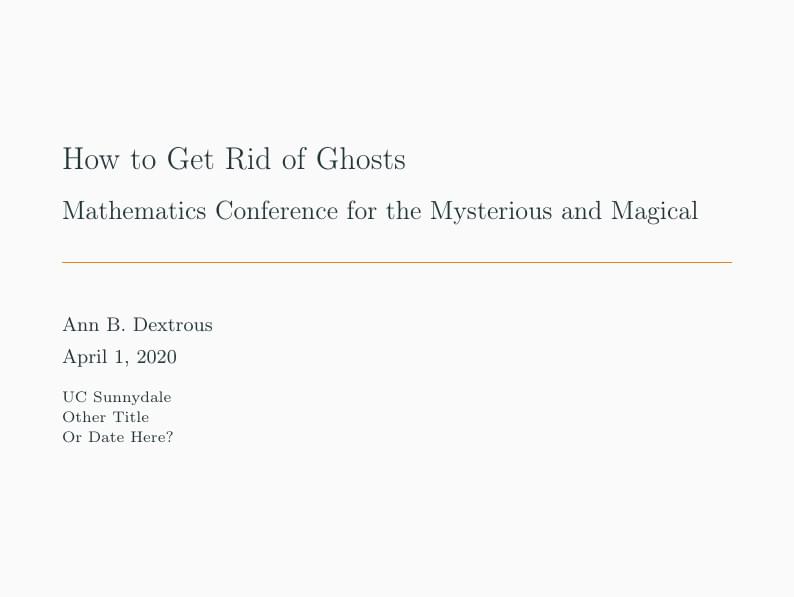
Beamer Template
Auteur:
Caleb McWhorter
Last Updated:
il y a 6 ans
License:
Creative Commons CC BY 4.0
Résumé:
A template for creating a beamer talk.

\begin
Discover why over 25 million people worldwide trust Overleaf with their work.

\begin
Discover why over 25 million people worldwide trust Overleaf with their work.
\documentclass[10pt,dvipsnames]{beamer}
\usetheme[progressbar=frametitle,numbering=none]{metropolis}
% Metropolis by Matthias Vogelgesang, CC-BY-SA
% Metropolis Documentation: https://www.ctan.org/pkg/beamertheme-metropolis
% Compile with XeTeX
% -------------------
% Packages
% -------------------
\usepackage{
amsmath, % Math Environments
amssymb, % Extended Symbols
enumerate, % Enumerate Environments
graphicx, % Include Images
lastpage, % Reference Lastpage
multicol, % Use Multi-columns
multirow, % Use Multi-rows
pifont, % For Checkmarks
stmaryrd % For brackets
}
\usepackage[english]{babel}
% -------------------
% Font
% -------------------
\usepackage[T1]{fontenc}
\usepackage{mathpazo}
% -------------------
% Tikz & PGF
% -------------------
\usepackage{tikz}
\usepackage{tikz-cd}
\usetikzlibrary{
calc,
decorations.pathmorphing,
matrix,arrows,
positioning,
shapes.geometric
}
\usepackage{pgfplots}
\pgfplotsset{compat=newest}
% -------------------
% Theorem Environments
% -------------------
\theoremstyle{plain}
\newtheorem{thm}{Theorem}[section]
\newtheorem{prop}{Proposition}[section]
\newtheorem{lem}{Lemma}[section]
\newtheorem{cor}{Corollary}[section]
\theoremstyle{definition}
\newtheorem{ex}{Example}[section]
\newtheorem{nex}{Non-Example}[section]
\newtheorem{dfn}{Definition}[section]
\theoremstyle{remark}
\newtheorem{rem}{Remark}[section]
\numberwithin{equation}{section}
% -------------------
% Commands
% -------------------
% Special Characters
\newcommand{\N}{\mathbb{N}}
\newcommand{\Z}{\mathbb{Z}}
\newcommand{\Q}{\mathbb{Q}}
\newcommand{\R}{\mathbb{R}}
\newcommand{\bC}{\mathbb{C}}
% Math Operators
\DeclareMathOperator{\im}{im}
\DeclareMathOperator{\Span}{span}
% Special Commands
\newcommand{\pf}{\noindent\emph{Proof. }}
\newcommand{\ds}{\displaystyle}
\newcommand{\defeq}{\stackrel{\text{def}}{=}}
\newcommand{\ov}[1]{\overline{#1}}
\newcommand{\ma}[1]{\stackrel{#1}{\longrightarrow}}
\newcommand{\twomatrix}[4]{\begin{pmatrix} #1 & #2 \\ #3 & #4 \end{pmatrix}}
% -------------------
% Title
% -------------------
\title{How to Get Rid of Ghosts}
\subtitle{Mathematics Conference for the Mysterious and Magical}
\author{Ann B. Dextrous}
\date{April 1, 2020}
\institute{UC Sunnydale \\ Other Title \\ Or Date Here?}
% -------------------
% Content
% -------------------
\begin{document}
\maketitle
% Motivation
\section{Motivation}
% My Motivation
\begin{frame}
My motivation in giving this talk is to get a Ph.D. \dots
\end{frame}
% Definitions & Examples
\begin{frame}
Here is my definition\dots
\begin{dfn}[Ph.D.]
A Ph.D. is something you sweat and cry for.
\end{dfn}
\begin{ex}
I studied so hard for my qualifying exam I replaced my childhood memories with an entire chapter of Hartshorne's \emph{Algebraic Geometry}.
\end{ex}
\end{frame}
% Main Results
\section{Main Results}
% Theorem
\begin{frame}
\begin{thm}[D.]
For all $n$, we have $n^2= n \cdot n$.
\end{thm}
\pf With massive loss of generality, let $n=1$. Then we have
\[
1=1^2= 1 \cdot 1= 1
\]
Therefore by overwhelming hope, it must always be true. \qed
\end{frame}
% Corollary
\begin{frame}
Most algebra you need to be true is true.
\begin{cor}
For all $n,m \in \N$, $(n+m)^2= n^2 + m^2$.
\end{cor}
\end{frame}
% Applications
\section{Applications}
% Application 1
\begin{frame}
\begin{enumerate}[1.]
\item Bleach is mostly water. \pause
\item We are mostly water. \pause
\item Therefore, we are bleach.
\end{enumerate} \vspace{0.5cm}
Now we pause for the big reveal\dots \pause \vspace{0.3cm}
\begin{itemize}
\item I am clearly a master of logic.
\item Masters of logic get Ph.D's.
\item I have earned this.
\end{itemize}
\end{frame}
% Math
\begin{frame}
Finally! Some Math! \vspace{1cm}
Here is some Math: $\int_1^\alpha \dfrac{x^2}{\sin x^2} \;dx$ and $\sum i^2$. \vspace{1cm}
But you could make this Math big inline with `displaystyle': $\ds \int_1^\alpha \dfrac{x^2}{\sin x^2} \;dx$ and $\ds \sum i^2$. \vspace{1cm}
And even more Math:
\[
\oint \vec{\nabla} \times \vec{F} \;dV = \sum_{n=1}^\infty \ov{p} \twomatrix{a}{b}{c}{d}
\]
\end{frame}
% Conclusion
\section{Conclusion}
% End Slide
\begin{frame}
Ph.D. plz\dots
\end{frame}
% Questions
{\setbeamercolor{palette primary}{fg=white, bg=gray}
\begin{frame}[standout]
Questions?
\end{frame}
}
\end{document}